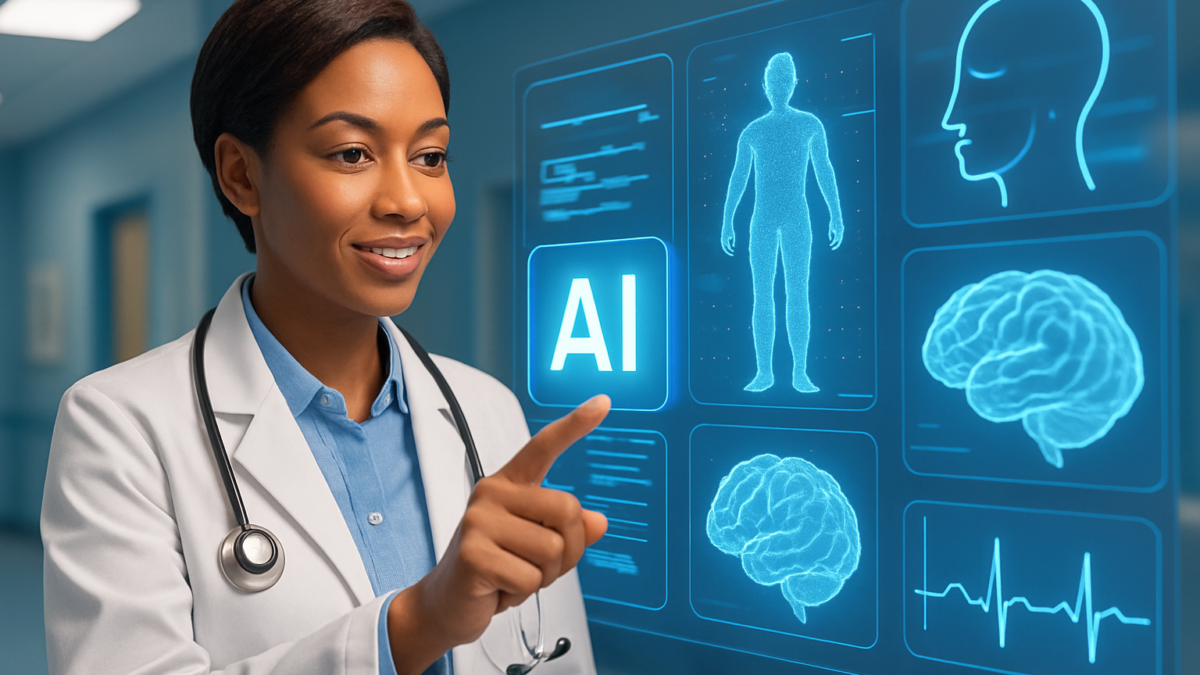AI in Healthcare: Transforming Patient Care, Diagnosis & Medical Innovation in 2025
Table of Contents
Introduction
The global healthcare industry is undergoing a massive digital transformation and at the center of it lies Artificial Intelligence (AI). From early diagnosis and robotic surgeries to personalized treatment plans and predictive analytics, AI in healthcare is reshaping how doctors, patients, and systems interact.
In 2025, AI has evolved beyond being just a diagnostic assistant it’s now a strategic partner in patient care, improving accuracy, accessibility, and efficiency. This blog explores how AI is driving the next wave of healthcare innovation and what the future holds for medical technology.
The Rise of AI in Modern Medicine
Healthcare data is exploding. With millions of medical records, lab results, imaging scans, and wearable data generated every day, doctors face an impossible challenge: analyzing everything in time to make informed decisions.
That’s where AI steps in. Using machine learning, computer vision, and natural language processing (NLP), AI systems can analyze vast amounts of medical data within seconds identifying patterns invisible to the human eye.
For instance, AI algorithms can now detect early signs of breast cancer in mammograms with accuracy rates surpassing radiologists, or predict cardiac events before they occur based on real-time ECG analysis.
How AI Is Transforming Healthcare
1. Early Disease Detection & Diagnosis
AI-driven diagnostics have redefined how diseases are detected. Platforms like Google’s DeepMind and IBM’s Watson Health use machine learning to analyze medical images, detect tumors, and even flag anomalies in genetic data.
In oncology, for example, AI tools can predict the likelihood of cancer recurrence or suggest customized treatment options based on a patient’s unique genetic makeup. This means faster diagnoses, fewer errors, and better outcomes.
2. Personalized Treatment & Predictive Care
Gone are the days of “one-size-fits-all” medicine. With AI, doctors can create personalized treatment plans tailored to an individual’s biology, lifestyle, and history.
By integrating genomic data and real-time patient monitoring from wearables, AI can predict disease risks and suggest preventive steps. For instance, AI-enabled apps can alert diabetic patients about potential glucose spikes hours before they occur — helping them adjust medication or diet proactively.
This kind of predictive and preventive care is transforming healthcare from reactive to proactive.
3. Robotic Surgery and Smart Operating Rooms
AI-powered robots are assisting surgeons with precision and consistency unmatched by humans alone.
Systems like da Vinci Surgical Robot can analyze real-time data during surgery, anticipate complications, and adjust movements in milliseconds.
In the near future, AI-driven robotic operating rooms will coordinate lighting, imaging, and surgical tools automatically — allowing surgeons to focus entirely on patient care.
4. Drug Discovery & Clinical Trials
Traditional drug discovery can take over a decade and cost billions. AI accelerates this process by simulating molecular interactions and identifying promising compounds in weeks instead of years.
Pharma companies like Pfizer and Moderna are already using AI to design new vaccines and drugs faster, safer, and more cost-effectively. AI also enhances clinical trials by identifying suitable candidates, predicting outcomes, and minimizing human error in data reporting.
This means faster access to life-saving treatments and reduced costs for healthcare providers.
5. Virtual Health Assistants & Patient Engagement
AI-powered virtual assistants such as Babylon Health, Ada, and Buoy are helping patients self-assess symptoms, schedule appointments, and track medication.
For healthcare providers, this means fewer administrative burdens and better engagement. For patients, it offers accessibility, affordability, and round-the-clock support — particularly crucial in remote or underserved areas.
These systems are becoming the first line of care, offering triage, follow-ups, and guidance before a doctor’s visit.
Ethical Challenges & The Human Element
While AI promises incredible progress, it raises ethical questions around data privacy, bias, and accountability.
Healthcare data must be handled with transparency and consent. Moreover, biased datasets can lead to misdiagnoses, especially in underrepresented populations. Thus, combining AI precision with human empathy remains essential.
Hospitals and tech firms must ensure that AI remains a tool to enhance, not replace, human judgment.
The Future: AI as a Doctor’s Copilot
By 2030, the relationship between doctors and AI will be symbiotic. Physicians will rely on AI as a “copilot” — assisting in real-time analysis, treatment planning, and patient communication.
AI will help hospitals manage resources efficiently, automate documentation, and even predict regional health crises before they escalate.
Ultimately, the future of healthcare isn’t AI vs. humans — it’s AI with humans. Together, they’ll redefine what’s possible in medicine.
Conclusion
AI is revolutionizing healthcare in ways that once seemed impossible — diagnosing faster, personalizing treatment, and improving outcomes. From hospitals to home-based health apps, every touchpoint of the patient journey is becoming smarter, faster, and more connected.
As we look ahead, AI won’t just treat illnesses it will help prevent them. That’s the real future of healthcare.
Ready to fill your pipeline with qualified leads? Get started with iTMunch’s B2B lead generation services today.
You May Also Lk: How Whitepapers Can Accelerate ABM (Account-Based Marketing) Strategies in B2B





